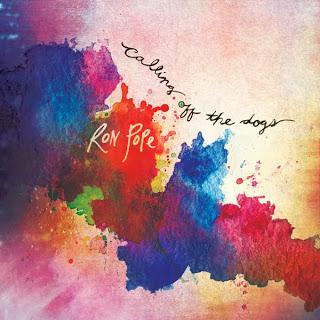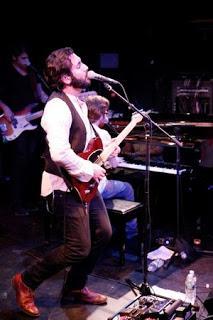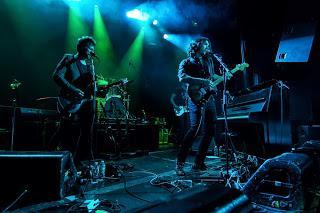En primer lugar, muchas gracias por concederme esta entrevista. ¿Qué pensaste cuando te enteraste de que una bloggera española quería entrevistarte ?
-Es emocionante conectar con la gente en nuevas partes del mundo!
En tus letras hablas sobre la experiencia humana sobre temas como el amor, la amistad...temas que puede entender todo el mundo y de lo que significa ser humano pero para Ron Pope ¿Cuál es el tema que más le inspira de la experiencia humana?
-Creo que es inspirador e interesante de ver las formas en que las vidas de todos se alinean y son similares. Gran parte de lo que todos experimentamos es muy parecido, aunque no siempre lo parezca. Eso es un elemento de la experiencia humana por la que estoy muy fascinado.
Publicas "The District", "the District Does Christmas",y "Last Call", viajas por el país; ¿Qué recuerda de esa época? ¿Cómo es capaz uno de digerir todo el cambio que vive, de pasar del anonimato a ser álguien conocido?
-Al principio de mi carrera, tuve la oportunidad de viajar con mis mejores amigos tocando música en un entorno discreto debido a que no había mucha gente viéndonos. Pude perfeccionar mis habilidades en un lugar cómodo y relajado. Ahora, cuando tocamos a mil personas en Londres o a diez mil personas en un festival en algún lugar, puedo hacerlo con comodidad y facilidad. Esa fue la bendición de pasar mucho tiempo "pagando mis deudas" de la vida en la carretera. Por suerte, mi progresión desde relativamente desconocido a "más o menos conocido" ha sido bastante gradual, por lo que nunca ha sido raro o incómodo. Con todo esto dicho, es bastante increíble saber que la gente va a aparecer cada vez que tocamos.
Jimi Hendrix es para usted una influencia músical ¿Si pudieras viajar por unas horas al pasado y encontrarte con él ¿Qué tema te gustaría tocar junto a él?
Little Wing. Es mi canción favorita de Hendrix. Probablemente querría solamente sentarme y hablar con él si sólo tuviéramos unas horas. Tengo tantas preguntas.
En 2008 publica en solitario Daylight ¿Qué le hace dar el paso y sacar ese álbum usted solo?
 -En ese momento, empecé a tener a un montón de grandes sellos discográficos que me prestaban atención porque ya había empezado a vender mucha música por mi cuenta. Saqué un montón de música por mi cuenta porque pensé que tenía sentido crear arte y conectar con mis fans, sin ninguna interferencia. Resulta que siempre ha sido la mejor política para mí.
-En ese momento, empecé a tener a un montón de grandes sellos discográficos que me prestaban atención porque ya había empezado a vender mucha música por mi cuenta. Saqué un montón de música por mi cuenta porque pensé que tenía sentido crear arte y conectar con mis fans, sin ninguna interferencia. Resulta que siempre ha sido la mejor política para mí.
¿Qué canción nunca puede faltar en un concierto suyo ? y ¿Cuál es la que la gente siempre le pide?
-Casi siempre toco "One Grain Of Sand" estos días. Esa es una de mis favoritas del álbum "Atlanta", y la gente responde muy bien a ella. La gente siempre nos pide que toquemos todo tipo de canciones de tiempos atrás en mi carrera, las cosas que escribí en mi dormitorio en la universidad o demos que saqué hace diez años. Honestamente, ¡Ya no conozco las palabras de la mayor parte de aquellas canciones!
¿Cree que hay diferencia entre el público americano y el europeo?

-El público es diferente de una noche a otra, de ciudad en ciudad, visita a visita. Quizás tengas un público loco, energético, borracho quienes quieren ir de fiesta en Berlín en una de las giras, y luego en la próxima gira, están más apagados, son más educados, e increíblemente tranquilos. Esa es una de mis partes favoritas de hacer gira, nunca se sabe lo que la noche puede traer!
¿Qué es lo más necesario para que un concierto, como espectador, sea perfecto? ¿Qué le pides?
-Como artista, lo más necesario es una buena audiencia. Si la gente se presenta y está emocionada, vamos a tener una gran noche. Yo diría lo mismo como espectador. Cuando voy a un show y la gente lo vive con la banda, el ambiente de la noche se convierte en algo realmente diferente y especial. Vi el concierto de U2 en el Giants Stadium de Nueva Jersey, con alrededor de 70.000 personas y toda la noche era como una experiencia religiosa. Esa es mi parte favorita de la experiencia de rock and roll en vivo, en casa, estás solo con la música, pero cuando vas a un concierto, de repente, eres parte de una comunidad. Hay algo mágico en eso.
- En 2003 se mudó a la Universidad de Nueva York, después de una lesión que puso fin a su carrera en el béisbol . ¿Qué recuerda de aquella época ? ¿Pensaste " y ¿ahora qué? " o lo tuviste claro ?
-Ciertamente, hubo un momento de "¿qué hago ahora?" , pero me sumergí rápidamente y de lleno en la música una vez que llegué a Nueva York. Tengo mucha energía y si no estoy metido en algo a tiempo completo, estoy miserable. Es mejor para mí tener una tarea a tiempo completo. La música se convirtió en eso para mí una vez el béisbol se fue. Yo siempre había tocado música y me encantaba, pero una vez que llegué a Nueva York me di cuenta de que era ahora o nunca.
- Si te quedas atascado , como muchos escritores hacen, ¿Dónde buscas la inspiración? ¿Qué hace usted ?
-Yo no me quedo bloqueado, porque sinceramente no creo en el bloqueo del escritor. Si me siento como si me quedase sin ideas, yo sigo escribiendo. A veces, lo que escribo termina siendo terrible y luego acabo revisando en un momento más adelante o tiro las canciones, pero yo siempre sigo intentándolo. Si tiras suficiente caña de pescaren el agua, con el tiempo, pillarás un pez.
¿Cómo es un día normal y corriente? ¿Tiene unos hábitos rutinarios o improvisa sobre la marcha?
-Depende de dónde estemos y lo que estemos haciendo. Cuando estoy escribiendo un álbum, me levanto, voy a correr, como algo , a continuación, escribo todo el día. Si estamos de gira en Europa, por lo general me despierto en un autobús turístico en frente del lugar donde será el concierto y voy a la prueba de sonido. Si estamos en los Estados Unidos, estoy en un hotel, y luego nos subimos a la furgoneta, viajamos a la siguiente ciudad, hacemos el show. Depende del día ...
¿Ha sentido la soledad pese a estar rodeado de gente?
-A veces, me imagino que cada uno se siente de esa manera.
El fenómeno fan tiene un lado oscuro, ¿En algún momento sufrió alguna situación complicada con un fan?
-Algunas personas están locas. Tanto si tienes quince años y te encuentras con una chica en la escuela que tenga un tornillo suelto o tienes cuarenta y cinco y el chico de tu trabajo es un desgraciado o eres un músico que está viajando por todo el mundo, todos nos encontramos bichos raros. He conocido más de lo que uno espera.
Me encantan las canciones "One grain of Sand" y "A drop in the ocean" tanto las letras como la melodía son preciosas y se te meten en la cabeza durante días y días.En estas dos canciones utilizas en una la guitarra y en otra el piano ¿Qué instrumento para usted es imprescindible y Por qué?
Yo soy, de oficio, un guitarrista. Toco el piano para escribir canciones y a veces en el escenario, pero sin duda no es mi instrumento principal. Soy dueño de una pedal Steel (esto es como una batería de acero y pedales , pero nunca he aprendido a tocarlo. Nate, mi guitarrista, aprendió a tocarlo y lo ha utilizado en el escenario, pero estoy perplejo con ello!
- ¿Podría definir brevemente su música?
-En tres palabras: No reggae. En serio. No sé cómo definir mi música. Mi mejor consejo es pasar algún tiempo escuchandola.
Aida- Sé que los músicos tienen canciones especiales que no se pueden publicar en un CD , ¿Has pensado en hacer una recopilación de estas canciones o en el futuro poner a alguna de ellas en un CD ?
-Yo ya he publicado todo lo que quiero sacar. Si grabo algo y me gusta, se lanza. Ese es una de las ventajas increíbles de ser un artista realmente independiente..
Aida- Mientras usted ha estado escribiendo o cantando , ¿Ha habido alguna vez una canción que le ha afectado más emocionalmente?
-En diferentes momentos de mi vida, diferentes canciones o álbumes me han golpeado. Siempre me parece increíble cómo algunas canciones te pueden transportar de vuelta a la primera vez que los escuchaste. Cada vez que escucho el disco de "Transatlanticism" llamado Death Cab For Cutie's, me recuerda a estar de gira con The District en 2005, porque en ese viaje, escuchamos ese álbum entero por lo menos una vez al día. Cada vez que el album suena, sólo por un momento, tengo 21 años, en la parte trasera de una furgoneta mirando hacia un cielo lleno de estrellas en Carolina del Norte con un mundo de posibilidades frente a mí. Ese disco me hace sentir.
Aida- ¿Cuál ha sido el lugar más extraño en dónde le ha venido la inspiración ? ¿Y el momento más extraño ?
-Hace años, se me ocurrió una canción completa en Broadway en el pueblo, caminando a casa del trabajo. Me senté en la acera y escribí la melodía. Después de llegar a casa, cogí una guitarra y lo toqué entera. La canción era "Make It Home" del álbum "Last Call" de The District's . Eso sólo me ha pasado en una ocasión más. Escribí entera "In My Bones" mientras tomaba una ducha hace unos años. Era como si me hubieran golpeado en la cabeza con una llave inglesa. BOOM y después había una canción. Salí de la ducha, me envolví en una toalla, me senté en el teclado, y toque esa canción hasta el final. Momentos locos de esos me dejan fascinados, porque a veces trabajas duro durante muchísimo tiempo para escribir una canción.
Aida- No tiene nada que ver con la música , pero : Me gustaría saber : ¿Qué piensa usted cuando mira a las estrellas en el cielo ?
-Cuando miro a las estrellas, pienso en el tiempo. Los Homo sapiens llegaron a existir hace unos cien mil años. Esos primeros humanos se sentaron alrededor de una fogata por la noche y miraron hacia el cielo, vieron esas mismas estrellas. Mi bisabuela miro hacia ese cielo y se maravilló ante esas mismas estrellas cuando ella era una niña hermosa en 1925 y un momento después en la década de los 80 cuando era una viejita caminando lentamente a la tienda de la esquina y preguntándose dónde se fue el tiempo . Pienso en lo insignificante que somos todos, lo corto que es nuestro tiempo , y cómo todo parece interminable. Me pregunto dónde encajo yo en todo esto y si mi tiempo en esta Tierra significa algo para alguien. El cielo nocturno me hacer pensar en cosas intensas, como poco.
- ¿Quieres añadir algo más a la entrevista o decir algo a los lectores españoles ?
-Espero veros a todos muy pronto! Mientras tanto, escuchad mi música. Mi nuevo disco "Calling Off The Dogs" acaba de salir, échale un vistazo!
First of all, thank you very much for giving me this interview.What did you think when you heard that a Spanish blogger wanted to interview you?
-It's exciting to connect with people in new parts of the world!
In your lyrics you speak about the human experience with topics such as love, friendship ... issues that everyone can understand and what it means to be human, but what inspires Ron Pope the most about the human experience?
-I think it's inspiring and interesting to look at the ways that everyone's lives line up and are similar. So much of what we all experience is incredibly similar, even if it doesn't always seem that way. That's an element of the human experience that I'm really fascinated by.

"The District", "The District Does Christmas" and "Last Call" were published and you traveled the country; What do you remember about those times? How is someone able to digest all the changes they go through, going from obscurity to someone well-known?
-Early on in my career, I got to travel around with my best friends playing music in an incredibly low key environment, because there weren't many people watching. I was able to refine my skills in a relaxed, comfortable place. Now, when we play for a thousand people in London or ten thousand people at a festival somewhere, I can do it with comfort and ease. That was the blessing of spending a long time "paying my dues" out there on the road. Luckily, my progression from relative unknown to "sort of known" has been fairly gradual, so it's never been weird or awkward. With all of that said, it's pretty incredible to know that people are going to show up every time we play.
Jimi Hendrix is a musical influence of yours so, if you could travel to the past for a few hours and meet him, which song would you like to play with him?
-Little Wing. That's my favorite Hendrix tune. I'd probably just want to sit and talk with him if we only had a few hours. I have so many questions.
In 2008 you published "Daylight" on your own, what made you decide to release this album by yourself?
-At that juncture, I'd started to have a bunch of major labels paying attention to me, because I'd already started to sell a lot of music on my own. I released a bunch of music on my own because I figured it made sense to create some art and connect with my fans without any interference. Turns out, that's always been the best policy for me.
Which song is never left out of your concerts? And, what is the song that people always ask you to play?-I almost always play "One Grain Of Sand" these days. That's one of my favorites from the "Atlanta" album and people respond very well to it. People always ask us to play all kinds of songs from way back in my career; things I wrote in my bedroom in college or demos I put out ten years ago. Honestly, I don't know the words to most of those songs anymore!
Do you think there is a difference between the American and European audience?
-The audiences are different from night to night, town to town, visit to visit. You might have a crazy, energetic, drunk crowd who all want to party in Berlin one tour, and then the next tour, they're subdued, polite, and incredibly quiet. That's one of my favorite parts of touring; you never know what the night may bring!
What's the most necessary thing for a concert? As a spectator, what are you looking for in a show?
 -As an artist, the most necessary thing is a good audience. If the crowd shows up and is excited, we're going to have a great night. I'd say the same thing as a spectator. When I come to a show and the crowd is incredibly in it with the band, the vibe of the evening becomes something really different and special. I saw U2 play at Giants Stadium in New Jersey with about 70,000 people and the entire evening bordered on a religious experience. That's my favorite part of the live rock and roll experience; at home, you're alone with the music, but when you go to a concert, all of a sudden you're part of a community. There's something magical about that.
-As an artist, the most necessary thing is a good audience. If the crowd shows up and is excited, we're going to have a great night. I'd say the same thing as a spectator. When I come to a show and the crowd is incredibly in it with the band, the vibe of the evening becomes something really different and special. I saw U2 play at Giants Stadium in New Jersey with about 70,000 people and the entire evening bordered on a religious experience. That's my favorite part of the live rock and roll experience; at home, you're alone with the music, but when you go to a concert, all of a sudden you're part of a community. There's something magical about that.
In 2003 you moved to the University of New York, after an injury which ended your baseball career. What do you remember of that time? Did you think "and what now?" or was it clear to you?
-There was certainly a "what do I do now" moment, but I was pretty quick to dive into music full time once I got to New York. I have a lot of energy and if I'm not locked in on something full time, I'm miserable. It's best for me to have a full time task. Music became that for me once baseball went away. I'd always played music and loved it, but once I got to New York I realized it was now or never.
If you get stuck like many writers do, where do you look for inspiration? What do you do?
-I don't get stuck, because I honestly don't believe in writer's block. If I feel like I'm out of ideas, I just keep on writing. Sometimes, what I write ends up being terrible and then I end up revising at a later date or throwing the songs away, but I always just keep on plugging. If you put enough lines in the water, eventually, you'll catch a fish.
What is a normal day in your life like? Do you have a routine or do you mostly improvise?
-It depends on where we are and what we're doing. When I'm writing an album, I wake up, go for a run, eat some food, then write all day. If we're on tour in Europe, usually I wake up in a tour bus in front of a venue and then go to soundcheck. If we're in the States, I'm in a hotel, then we'll get in the van, travel to the next city, play the show. Depends on the day...
Have you every felt lonely despite being surrounded by people?
-At times, I'd imagine everyone feels that way.
The fan phenomenon has a dark side, have you ever been in a complicated situation with a fan?
-Some people are crazy. Whether you're fifteen years old and you meet a girl at school who's got a screw loose or you're forty five and the guy at your job is a creep or you're a musician who's traveling all over the world, we all encounter weirdos. I've met more than my fair share.
I love the songs “One Grain of Sand " and "A drop in the ocean", both the lyrics and melodies are beautiful and they stay in your head easily for days and days. You use a guitar in one song and the piano in the other. What instrument is essential to you and why? And, what instrument have you never dared to play but would like to?-I am, by trade, a guitar player. I play the piano to write songs and sometimes on stage, but it's certainly not my main instrument. I own a pedal steel, but have never learned to play it. Nate, my guitarist, learned to play it and has used it on stage, but I'm mystified by the thing!
-Could you briefly define your music?
-In three words: Not reggae. Seriously. I don't know how to define music. My best advice is to spend some time listening.
Aida-I know that musicians have special songs that can't be published on a CD, have you thought about doing a compilation of these songs or in the future putting any of them on a CD?
-I've already released everything I want to put out. If I record something and I like it, it gets released. That's one of the incredible benefits of being a truly independent artist.
Aida-While you have been writing or singing, has there ever been a song which has affected you more emotionally?
 -At different times in my life, different songs or albums have struck me. I always find it amazing how some songs can transport you back to the first time you heard them. Whenever I hear Death Cab For Cutie's "Transatlanticism" album, it reminds me of being on tour with The District in 2005, because on that trip, we listened to that album all the way through every single day at least once. Whenever that record comes on, just for a moment, I'm 21 years old, in the back of a van staring up at a sky full of stars in North Carolina with a world of possibility in front of me. That record makes me feel.
-At different times in my life, different songs or albums have struck me. I always find it amazing how some songs can transport you back to the first time you heard them. Whenever I hear Death Cab For Cutie's "Transatlanticism" album, it reminds me of being on tour with The District in 2005, because on that trip, we listened to that album all the way through every single day at least once. Whenever that record comes on, just for a moment, I'm 21 years old, in the back of a van staring up at a sky full of stars in North Carolina with a world of possibility in front of me. That record makes me feel.
Aida-Which has been the strangest place where one has come the inspiration? and the moment?
-Years ago, I came up with an entire song on Broadway in the Village, walking home from work. I just sat down on the sidewalk and wrote the tune down. After I got home, I picked up a guitar and played it all the way through. The song was "Make It Home" from The District's record "Last Call." That's only happened to me one other time. I wrote all of "In My Bones" while taking a shower a few years ago. It was like I got hit in the head with a wrench. Just BOOM and then there was a song in there. I got out of the shower, wrapped myself in a towel, sat down at the keyboard, and played that song all the way through. Crazy instances like that blows my mind, because sometimes you labor for ages to write a song.
Aida-It does not have anything to see with the music but: I would like to know :What do you think when you look at the stars in the sky?
-When I look at the stars, I think about time. Homo sapiens came into existence a few hundred thousand years ago. Those early humans sat around a fire at night and looked up at the sky; they saw those same stars. My great grandmother looked up at that sky and marveled at those same stars when she was a beautiful young girl in 1925 and then a moment later in the 80's when she was a little old lady walking slowly to the corner store and wondering where the time went. I think about how insignificant we all are, how short our time is, and how endless it all seems. I wonder where I fit in the continuum of it all and whether my time on this Earth means anything to anyone. The night sky gets my mind into some heavy stuff, to say the least.
Would you like to add anything else to the interview or say something to the Spanish readers?
-I hope to see all of you very soon! In the meantime, listen to my music. My new record "Calling Off The Dogs" just dropped; check it out!
OFICIAL WEBSITE-Muchas gracias a Blair y Ron -Fotos de la web de Ron hechas por Blair C -Lisa M Rose por ayudarme con la traduccíón -Gracias a Aida Fernández por las 4 preguntas y por darme a conocer la música de Ron
-Thank you very much Blair and Ron
-Photos made it by Blair c from the website -Lisa M Rose for helping me with the translation -Thank you Aida for the 4th questions and let me know the music of Ron

